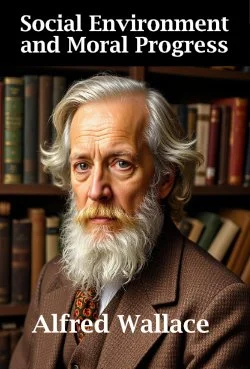Social Environment and Moral Progress :
By Alfred Wallace (Author), Colin Heston (Introduction) Format: Kindle Edition
Alfred Russel Wallace’s final major work, Social Environment and Moral Progress, is a profound reflection on human morality, society, and evolution, written at the culmination of a life devoted to scientific inquiry and humanitarian ideals.
Wallace argues that morality is an enduring and intrinsic aspect of human nature, resilient even in the face of adverse social conditions. He traces the persistence of moral truth throughout history, asserting that the "divine spark" of ethical consciousness cannot be extinguished by ignorance, poverty, or injustice . A central theme of the book is Wallace’s critique of industrial capitalism and social inequality. He condemns the Victorian era’s rapid economic growth for fostering unprecedented social immorality, where wealth accumulation came at the cost of human dignity and justice . He describes the social environment of his time as "rotten from top to bottom," emphasizing the failure of governments and elites to address widespread poverty and suffering . Wallace also challenges the misuse of evolutionary theory, particularly the ideas promoted by eugenicists and social Darwinists. He strongly opposes the notion that society should decide who is "fit" to reproduce, calling such policies morally repugnant and scientifically flawed .Instead, Wallace proposes a radical alternative rooted in cooperation and equality. He advocates for a universal basic income, believing it would empower individuals—especially women—to make reproductive choices freely and responsibly, reduce poverty, and foster a more moral and civilized society . He envisions a future where education, health, and freedom are universally accessible, allowing natural selection to operate through informed and compassionate human choices rather than brutal competition.
Wallace’s work stands as a visionary blend of evolutionary science and social reform, offering a hopeful and humanistic perspective on progress. His belief in the moral potential of humanity and the need for systemic change remains strikingly relevant today.
Read-Me.Org Inc. New York-Philadelphia-Australia. 2025. 111p.


